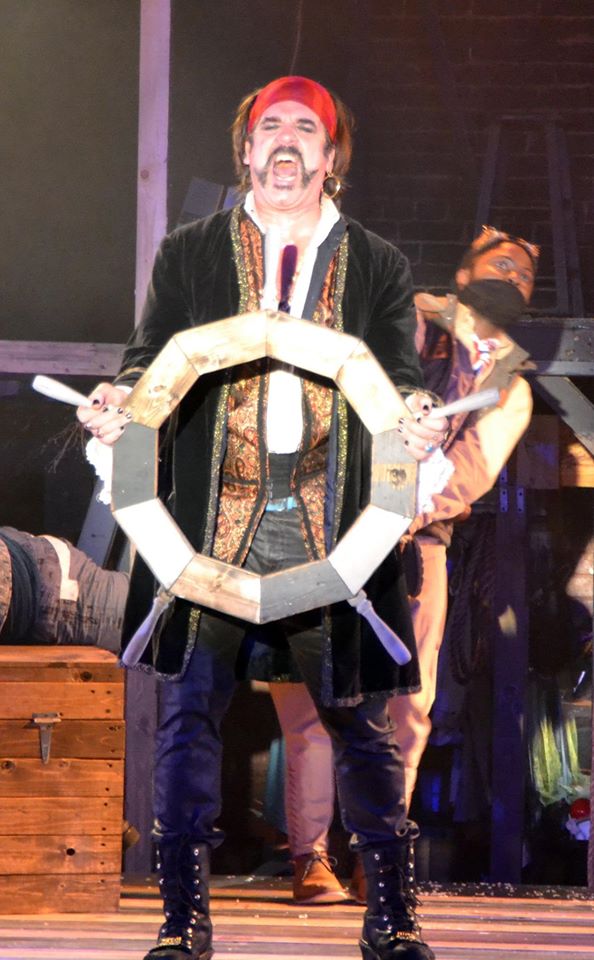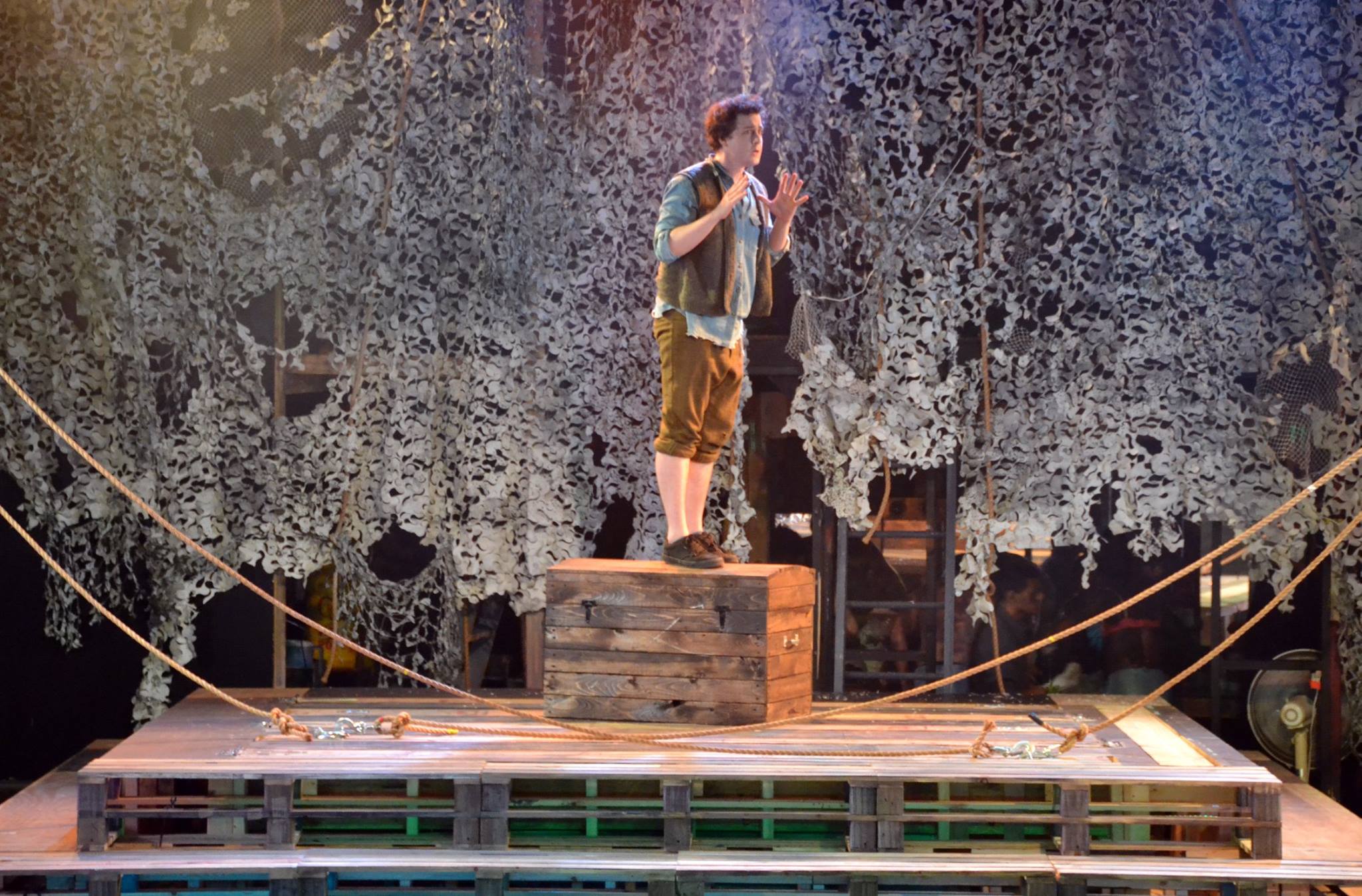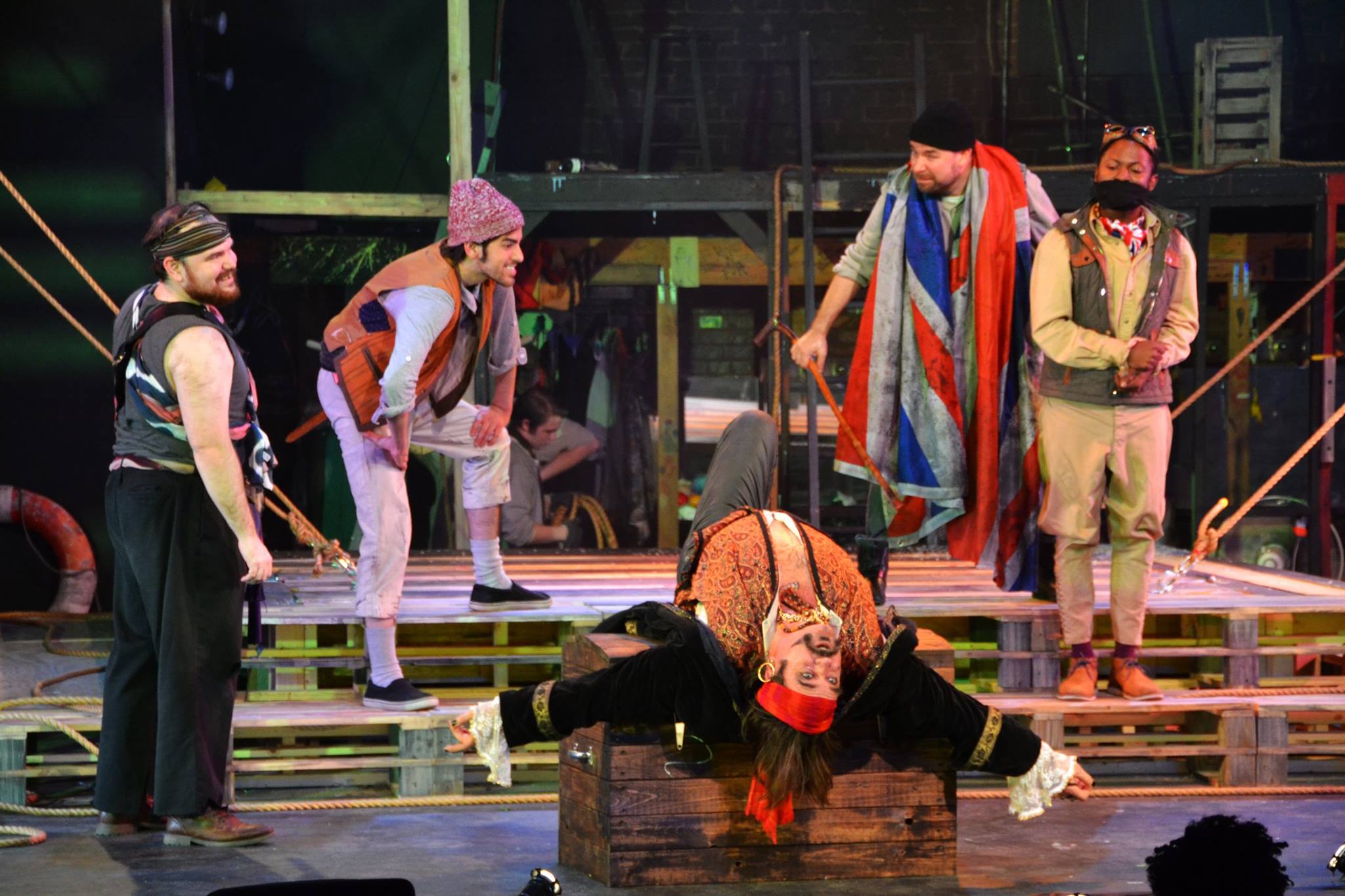John Tuttle is, by any standard, a man with a talent for writing, but after seeing the world premiere of his play, Boy About Ten, I can affirm that he is also quite adept at articulating human relationships. Indeed, the oft-troubled intertwining of Boy About Ten’s dysfunctional, but (somewhat) connected nuclear family of four, drives the plot of Tuttle’s work, taking a well-written piece to the level of a performance bristling with all the sharp edges relationships can provide. This is not to suggest that the production currently running at Trustus is without laughter or light-hearted moments. It may be a tragicomedy, but Boy About Ten doesn’t hesitate to let the tragic cede the stage to the comedic in a legitimate, story-faithful way. In his program notes, Trustus Artistic Director, Chad Henderson, comments that “this play has undergone a more involved development process than our previous Playwrights Festival winners or commissions,” which no doubt contributed to the feeling of polish and streamlining found in the script. I managed to make notes on some of the truly standout lines, but by no means is my list comprehensive.
The play opens with D’Loris (Lonetta Thompson), a kindhearted but world-weary social worker, dealing with what is clearly a family in distress. She is trying to prepare Todd (Tommy Wiggins), the elder son, to go to his mothers’ house for a week. Todd is obviously troubled in multiple ways, but is largely nonverbal, using a set of oversized headphones to drown out the conflict which surrounds him, while hiding his face behind his chin-length bangs. As usual, Thompson creates a fully-realized, textured character, who has flaws as well as sincerely caring nature. I never tire of seeing Thompson onstage, as she is always completely immersed in and committed to her character and the moment. It would have been the easy way out to depict D’Loris as either a hyper-idealistic Wonder Woman, or as a “honey, I’ve seen it all,” world-weary cynic, but Thompson chose to create someone in-between, and in the process, gave the audience a layered, complex, and realistic performance. Kudos also to Wiggins, a former Trustus Apprentice Company member, making his mainstage debut. Though Todd doesn’t speak much, especially in the early scenes, his body language, movement style, and a sort of self-embrace clearly establish him as a damaged human being, doing his best to avoid his psychic pain. When it is revealed that he is a self-cutter/burner, it is a bit of a shock, but totally believable for the character he has, by that point, made three-dimensional. I suspect we’ll be seeing much more of Wiggins on the Trustus stage in seasons to come, and I look forward to watching his development as an actor.
The arrival of Tammy (Jennifer Hill), lightens the mood by, ironically, introducing the least likeable of the five characters. Hill’s Tammy is brash, flashy, loud, and obnoxious, fancying herself far above the rest of the family. She dresses herself in designer clothing, while a couple of mentions are made of the kids’ clothes coming from Goodwill, and she personifies the cliche of the “helicopter parent,” dispensing screechy advice and criticism thinly veiled as “encouragement.” Hill’s comedic timing is absolutely spot-on, and she brought Friday night’s house down with such well-penned verbal spewings as “I was once a Sweet Potato Queen, now I’m a Cyclops!” (It seems that Tammy has a glass eye, which is broken, requiring her to wear an eye patch.) Clearly proud of her somewhat meager accomplishments, she touts having played Yum-Yum in a community college production of The Mikado, along with a few other small successes, in an attempt to impress D’Loris, who is eventually prompted to ask “what the hell is wrong with you people?” The moments of conflict between Tammy and D’Loris establish a curious dynamic. Tammy, in her own twisted, control-freak way, wants the best for her children, while D’Loris tries to help establish exactly that, which eludes the self-centered Tammy.
One gathers fairly quickly that Tammy is at her ex-husband’s house to swap out the younger son, Timmy, (Daniel Rabinovich), who is a straight-A, rule-abiding, do-gooder, complete with Webelos Scout uniform, and practically a stranger to Todd, and the two react somewhat cautiously to each other. (I may have missed an important line or mention of the situation, but it is clear that the brothers have not spent much time together.) Rabinovich demonstrates an actor’s sensitivities quite impressively, especially for a young actor. His character arc may well be the most dramatic in terms of growth and change, and he handles it like a true pro. As with Wiggins, this is a young man to watch.
Once all is settled, Timmy is left alone with his father, Terry. Played by Trustus mainstay, Paul Kaufmann, Terry is an affable, childlike n’ere-do-well, whose love for his sons manifests in an “at my house, there are no rules” dynamic. (When asked by Timmy if they can attend an Imax film or visit the Planetarium, Terry immediately scoffs at the thought of an educational outing, at least in the traditional sense.) Kaufmann, without ever breaking the established reality of the play, or mugging to the audience, brought to life an enchanting man-child, reminiscent of Tom Hanks in Big, with a dash of Bertie Wooster and Falstaff tossed in. To Timmy’s growing amusement, the two of them chug Cheerwine (no sodas allowed at Tammy’s house), fight ludicrous pretend war games against “Vagicilla, Dark Queen of the Nether Regions” (inspired, no doubt, by Tammy), and Timmy frequently receives his father’s military decorations, which may or may not be legit. It was at this point that I began to wonder about the show’s eponymous title. Was Timmy the Boy About Ten, or was his father? Had the parent/child dynamic between them already shifted before the action of the play began? Kaufmann, incidentally, scores one of the biggest laughs in the show while telling Timmy about his days in an ersatz KISS cover band. “You can always tell when chicks dig you. They chew their gum at you…like meat!”
A brief in-one scene gives us our sole glimpse of life at Tammy’s house, when the focus is, both literally and figuratively, on Todd, who is passively receiving an unwanted haircut from his mother. A special tip of the hat to Lighting Designer Laura Anthony, for transforming a simple floor lamp into a “where were you on the night of the robbery?” beacon. This is an occasion upon which the lighting truly made the scene for me. We, the audience, are semi-blinded by the intensity of the same light shining into Todd’s eyes, and subject to the same jabber from Tammy. Like a police officer in a bad, made-for-TV crime drama, she prattles on and on about how Todd should want to be “normal” and make friends “like all the other boys,” painting a Leave It To Beaver lifestyle, which will supposedly emerge with a haircut and a suit from Goodwill. Interrogation/indoctrination and “tough love” establish an uneasy coexistence at Tammy’s house, and the two children she raised reflect that. Timmy’s unblinking obedience earns him praise, so he obeys. Todd, whom I assumed to be somewhere on the autism spectrum, is unable to deal with what his senses perceive as blinding light and a barrage of impossible commands. Though short, this scene impacted me. I began to wonder through whose eyes we were seeing any given situation, and then viewing each scene from each character’s angle. Thank you, Jon Tuttle, for this (I’m guessing) three-page scene, which widened the lens through which I saw the rest of the play. Though she was the antagonist of the scene, it allowed a glimpse into Tammy’s desperate desire for a “normal, happy, family,” and humanized her for me.
I won’t go into too much detail about the second act, as it is, essentially, a minefield of spoilers, and much of what happens requires the elements of shock and surprise to work. While not without laughs, the second act takes a somewhat darker turn, with a grim family story, involving animal abuse, being revealed. (*While no violence is depicted onstage, a gruesome monologue could be mildly to moderately triggering for some.*) Terry childishly endangers his and Timmy’s lives at the end of act one, the aftermath of which, we see in act two. Todd returns, neatly trimmed and besuited, but still distant, albeit with the occasional smile of hope. Toward the end of the play, we discover that Terry suffered physical wounds far worse than Timmy’s while saving the boy from the dangerous results of his (Terry’s) recklessness. Romantic impossibilities are pondered and argued, D’Loris loses another crumb of her idealism, but hangs on to hope, Timmy takes his first step toward adult cynicism, Tammy reveals some game-changing information, and the family is left as we found them; bruised and battered, but oddly okay. The playwright leaves us with the idea that life will simply go on, and with the insanity and bizarre love in this family, who can even speculate on the eventual outcome?
Director Patrick Michael Kelly has taken an artfully written play, refined by much workshopping, and brought to the stage a world of slightly-heightened reality, never losing sight of the connecting themes of family and what it truly means to care for someone.
So, who is the Boy About Ten? I have my suspicions that each character, with the exception of D’Loris (who serves as the impartial observer and voice of reason) is that boy. Perhaps that answers my earlier question, and tips us off that the show is seen from D’Loris’ perspective.
Boy About Ten is an engaging, thought-provoking, and most enjoyable play, and a worthy addition to the Tuttle ouvre. Only four performances remain, so get your tickets now!
-- Frank Thompson
~~0~~
Tickets can be purchased online at Trustus.org , or by calling the Trustus Theatre box office on 803.254.9732
Remaining performance dates are:
Wednesday, August 22 – 7:30pm
Thursday, August 23 – 7:30pm
Friday, August 24 – 8:00pm
Saturday, August 25 – 8:00pm
Frank Thompson is the theatre editor for Jasper Magazine - contact him at flt31230@yahoo.com
~~0~~
JOIN THE JASPER GUILD TODAY AND SEE YOUR NAME IN THE NEXT ISSUE OF JASPER MAGAZINE
RELEASING FRIDAY SEPTEMBER 21 AT THE NEW STORMWATER STUDIOS
The Jasper Project is a non-profit all-volunteer organization that provides collaborative arts engineering for all disciplines of arts and artists in the South Carolina Midlands and throughout the state. Please help us continue to meet our mission of validating the cultural contributions of all artists and growing community within the arts by becoming a member of the Jasper Guild . We'll print your name in the magazine, thank you on social media, and love you forever!
www.JasperProject.org











